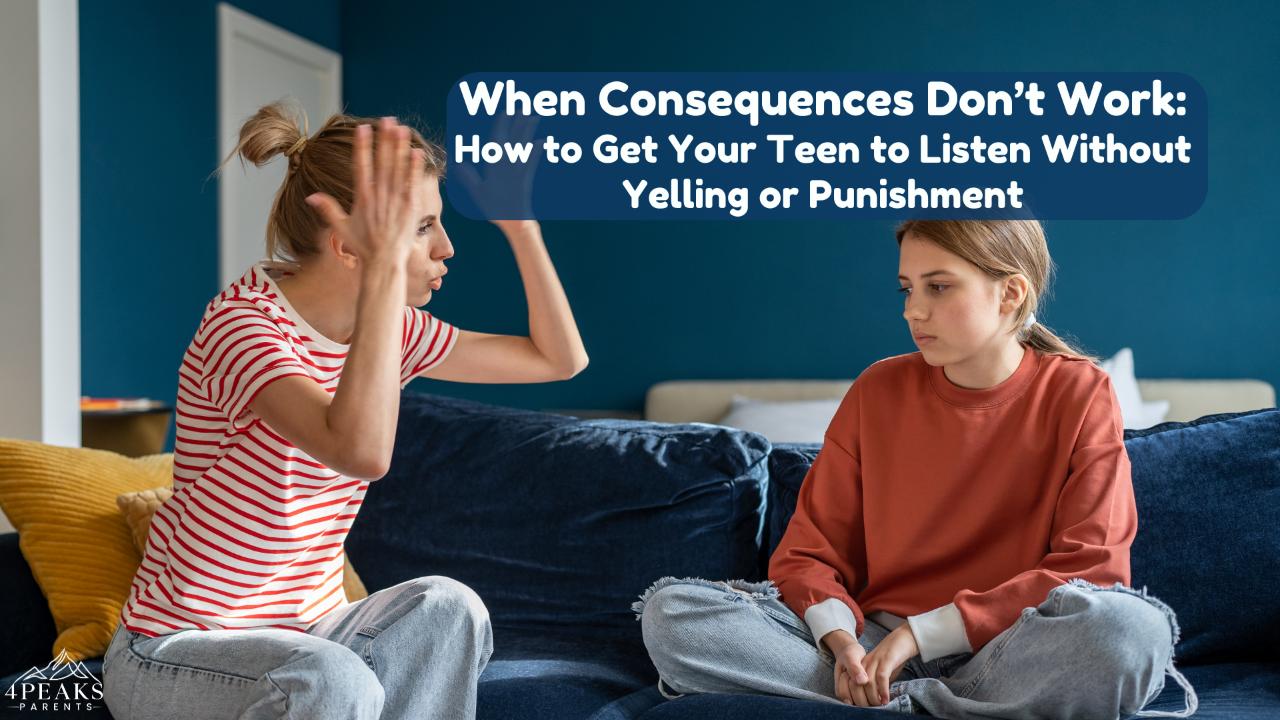When Consequences Don’t Work: How to Get Your Teen to Listen Without Yelling or Punishment
May 15, 2025
Let’s be real—parenting teens can feel like a constant battle. You lay down a consequence; they ignore it. You raise your voice; they shut down. You try to reason with them, and suddenly, you’re the bad guy.
If you’ve ever felt like you’re talking to a brick wall, you’re not alone. But here’s the truth: consequences alone won’t get your teen to listen—connection will.
Why Traditional Consequences Fail
Most parents fall into the trap of thinking:
❌ If I just take their phone away, they’ll finally change!
❌ If I ground them long enough, they’ll understand!
❌ If I yell louder, they’ll take me seriously!
Sound familiar?
The problem is that when teens feel attacked, punished, or controlled, their brains go into fight, flight, or freeze mode. They don’t reflect on their actions or learn from mistakes—they just resent you or shut you out.
What to Do Instead: The 4 Peaks Parents Approach
At 4 Peaks Parents, we focus on shifting the parent-child dynamic so that your teen chooses to listen—not out of fear, but out of trust and respect.
1️⃣ The Family Audit – Before you correct their behavior, ask yourself: What’s really going on beneath the surface? Is your teen acting out due to stress, peer pressure, or feeling unheard? Instead of jumping straight to punishment, get curious.
2️⃣ Emotional Mastery – The quickest way to get your teen to shut down? Parenting from a place of anger. If you’re emotionally charged, take a breath and reset before responding. The calmer you are, the more influence you have.
3️⃣ Upgrading Your Toolkit – Replace punishment with natural consequences and collaborative problem-solving. Instead of saying, “You’re grounded for not doing your homework,” try, “I noticed your grades are slipping. Let’s come up with a plan so this doesn’t happen again.” When teens feel heard, they’re more likely to cooperate.
4️⃣ Rewriting Your Family Story – If power struggles are the norm in your home, it’s time to rewrite the script. Focus on mutual respect, not control. Your teen needs to feel safe, valued, and understood—and when they do, they’ll naturally start listening more.
The Bottom Line: Shift the Relationship, Not Just the Rules
Yes, structure and boundaries are important, but they’re only effective when paired with connection, communication, and respect.
So next time your teen refuses to listen, instead of escalating the punishment, ask yourself:
👉 Am I focusing on control—or connection?
👉 Am I reacting—or responding with emotional mastery?
👉 Am I enforcing consequences—or guiding them toward real growth?
The answers to these questions will transform the way your family operates. And if you’re ready to dive deeper, I’d love to help.
📌 Book a free strategy call today, and let’s create a parenting plan that actually works: https://calendly.com/thomasmillercoaching/30m-appointments
You don’t have to yell to be heard. You just have to shift the way you lead.
Stay strong,
Thomas Miller
